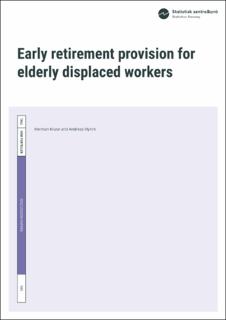Early retirement provision for elderly displaced workers
Working paper
Permanent lenke
https://hdl.handle.net/11250/3011665Utgivelsesdato
2022-08Metadata
Vis full innførselSamlinger
- Discussion Papers [1003]
Sammendrag
This paper studies the economic effects on re-employment and program substitution behavior among
elderly displaced workers who exogenously lose eligibility for their early retirement option. We use
detailed Norwegian matched employer-employee data containing information on bankruptcy dates
and individual-level wealth, income, pensions and social security benefits. Our empirical strategy
employs a regression discontinuity design, as job displacement before a certain age cut-off results in
the loss of eligibility for early retirement benefits between ages 62–67 years in Norway. We find that
re-employment rates are indistinguishable between workers who just retain eligibility for early
retirement benefits and those who just do not. Meanwhile, those who lose eligibility offset 69% of
their lost benefits through take-up of other social security benefits, where 51 percentage points
comes from disability insurance and 13 percentage points from unemployment insurance. Our
findings are particularly policy relevant as tightening of age-limits for old-age pensions is on the
agenda in several OECD countries, while current economic hardship throughout the region may lead
to increased job displacement for elderly workers.

